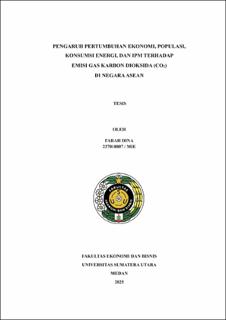Pengaruh Pertumbuhan Ekonomi, Populasi, Konsumsi Energi, dan IPM terhadap Emisi Gas Karbon Dioksida (CO2) di Negara ASEAN
Impact of Economic Growth, Population, Energy Consumption, and HDI on Carbon Dioxide (CO2) Emissions in ASEAN Countries

Date
2025Author
Dina, Farah
Advisor(s)
Pratomo, Wahyu Ario
Tanjung, Ahmad Albar
Metadata
Show full item recordAbstract
This research aims to analyze the impact of economic growth, population, energy consumption, and Human Development Index (HDI) on Carbon Dioxide (CO2) emissions in 11 ASEAN countries during the period 2013–2021. The research applies a dynamic panel regression method using the Generalized Method of Moments (GMM) approach. The research results indicate that although Economic Growth (GDP) has a positive yet insignificant impact in the short term, it shows a weak and positive impact in the long term, indicating continued reliance on fossil energy that has not been separated completely from economic growth. Population (POP) has a positive and significant impact on CO2 emissions, both in the short and long term, indicating that increasing population leads to higher energy demand and greater economic activity. Energy Consumption (ERG) has an insignificant impact, due to the diversity of energy sources, including renewable energy, or measurement inefficiencies. The Human Development Index (HDI) has a negative and significant impact, especially in the long term, showing that improving human quality through education, health, and the economy can promote sustainable development and reduce CO2 emissions. The policy implications of this research include controlling the impact of population through sustainable urban planning, strengthening environmentally based Human Development, decarbonizing economic growth, and implementing long-term strategies such as regional collaboration for a clean energy transition. These findings contribute theoretically to the advancement of the Environmental Kuznets Curve (EKC) model.
Collections
- Master Theses [540]
